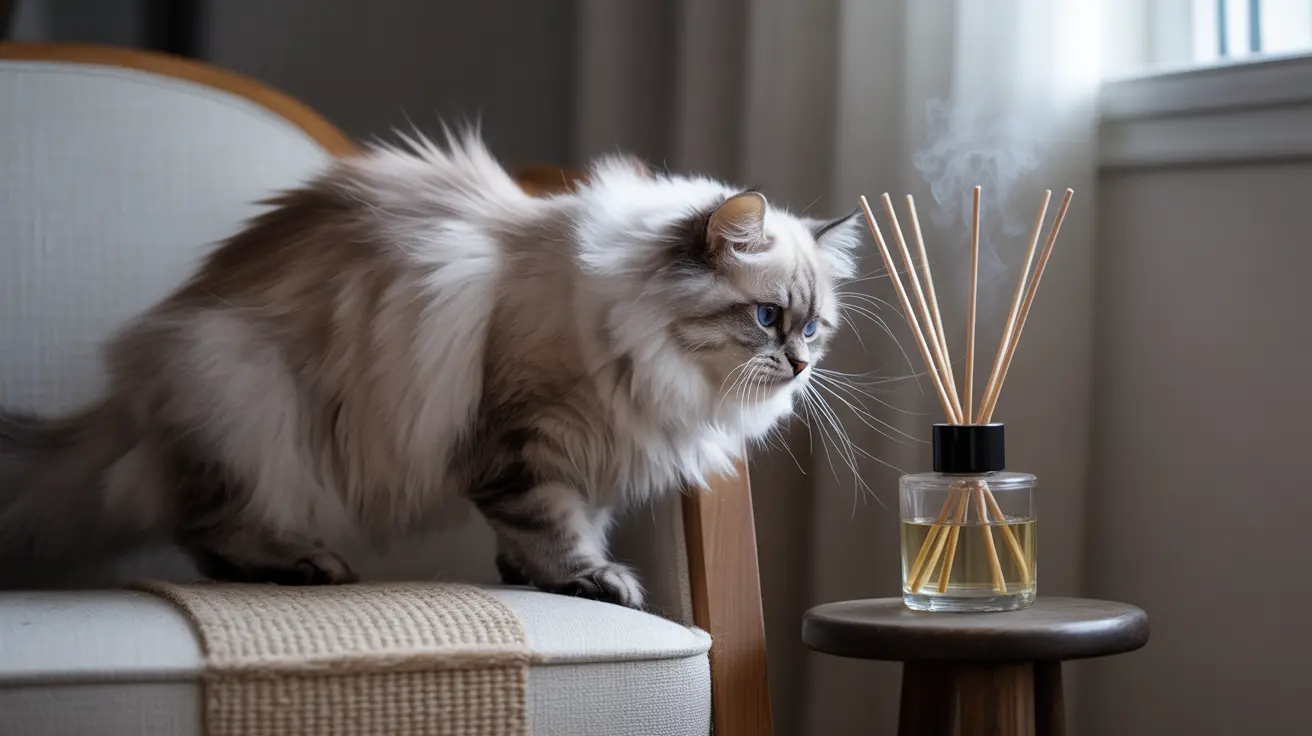How Reed Diffusers Work and Their Impact on Cats
Reed diffusers operate by allowing scented oils to travel up wooden reeds and slowly release fragrance into the air. While this seems harmless, the essential oils commonly used in these devices can be problematic for cats, who lack certain liver enzymes needed to process these compounds safely.
Unlike humans, cats are particularly sensitive to essential oils and other fragrances. Their advanced olfactory system and unique metabolism make them more vulnerable to potential toxic effects.
Dangerous Essential Oils in Reed Diffusers
Many common essential oils used in reed diffusers can be toxic to cats, including:
- Tea tree oil
- Eucalyptus
- Peppermint
- Citrus oils (lemon, orange)
- Cinnamon
- Pine
- Ylang ylang
Even small amounts of these oils can cause adverse reactions in cats through inhalation, skin absorption, or accidental ingestion during grooming.
Signs of Essential Oil Toxicity in Cats
If your cat has been exposed to harmful essential oils from a reed diffuser, watch for these warning signs:
- Drooling or vomiting
- Respiratory difficulties
- Lethargy or weakness
- Tremors or unsteady walking
- Coughing or sneezing
- Changes in behavior
- Redness around the mouth or on skin
Safe Usage Guidelines for Homes with Cats
If you choose to use reed diffusers, follow these essential safety measures:
- Place diffusers in rooms your cat cannot access
- Ensure proper ventilation in areas where diffusers are used
- Keep diffusers on high shelves or secured locations
- Clean up any spills immediately
- Monitor your cat for unusual behavior
- Consider pet-safe alternatives
Pet-Safe Alternatives to Traditional Reed Diffusers
Several safer options exist for maintaining a fresh-smelling home without risking your cat's health:
- Natural ventilation
- Cat-safe air purifiers
- Pet-specific deodorizing products
- Baking soda for odor absorption
- Fresh herbs in secure containers
- Regular cleaning routines
Frequently Asked Questions
Are reed diffusers safe to use around cats, and what makes them potentially harmful?
Reed diffusers can be harmful to cats due to the essential oils they contain. Cats lack certain liver enzymes needed to metabolize these compounds safely, making them susceptible to toxicity through inhalation, skin contact, or ingestion.
Which essential oils commonly found in reed diffusers are toxic to cats?
Common toxic essential oils include tea tree, eucalyptus, peppermint, citrus oils, cinnamon, pine, and ylang ylang. These oils can cause serious health issues in cats even in small amounts.
What symptoms should I watch for if my cat is exposed to essential oils from a reed diffuser?
Watch for symptoms like drooling, vomiting, respiratory problems, lethargy, tremors, unsteady walking, and behavioral changes. If you notice any of these signs, contact your veterinarian immediately.
How can I safely use reed diffusers in a home with cats to minimize health risks?
Place diffusers in rooms cats cannot access, ensure good ventilation, keep them out of reach, clean spills immediately, and monitor your cat's behavior. Consider using pet-safe alternatives instead.
Are there any cat-safe essential oils or alternatives for reed diffusers that I can use?
While some sources suggest vanilla or cedarwood as safer options, it's best to consult with your veterinarian before using any essential oils. Consider pet-safe alternatives like air purifiers or natural ventilation instead.
Conclusion
While reed diffusers can enhance your home's ambiance, the safety of your feline companion should always come first. By understanding the risks and implementing proper precautions, you can maintain a fresh-smelling home without compromising your cat's health. When in doubt, consult with your veterinarian about the safest options for your specific situation.






